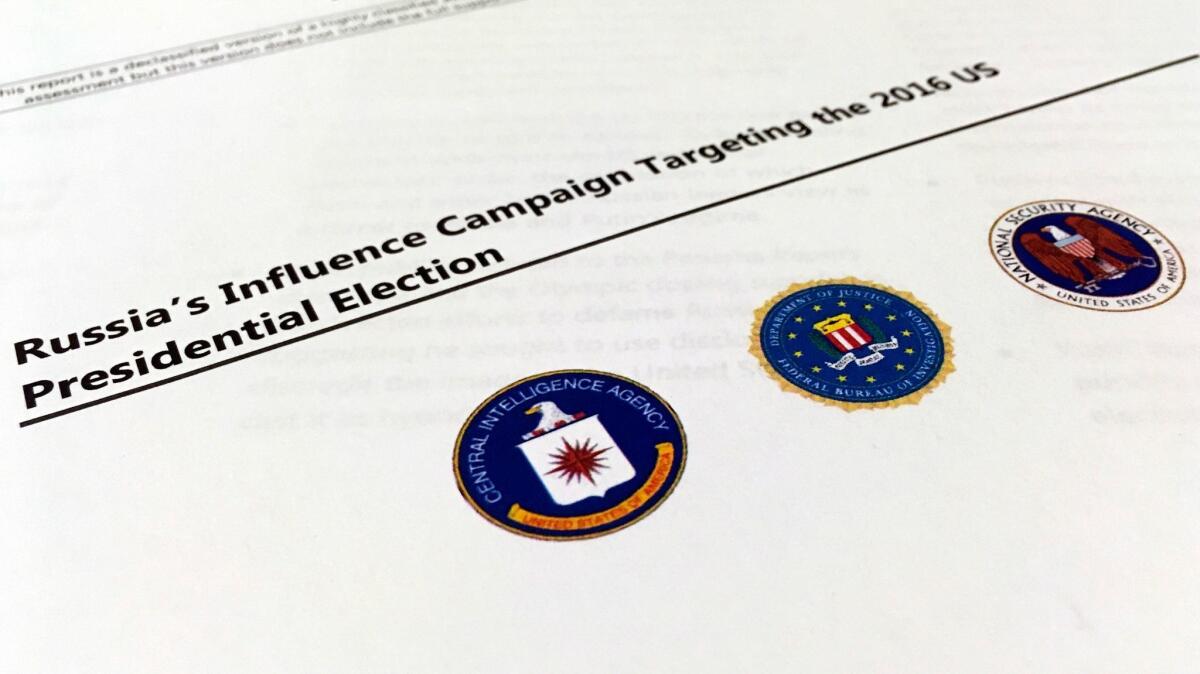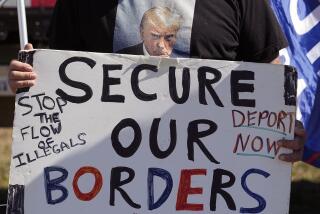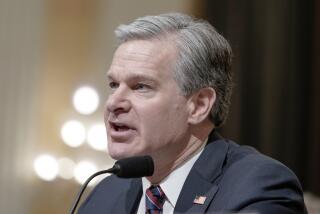U.S. intelligence report doesn’t say whether Russian hacking helped elect Trump

Although a blockbuster new U.S. intelligence report concludes that Russian President Vladimir Putin sought to help Donald Trump win the presidency, it didn’t weigh in on whether Moscow’s covert cyberhacks and other activities made a difference in Trump’s upset victory over Hillary Clinton.
In tweet after tweet, Trump has been emphatic that it did not. Democrats just as forcefully insist the effect was clear even if they don’t blame the Russians for her loss.
The truth is no one knows for sure because the election was so close in so many states that no one factor can be credited or blamed, especially in last year’s highly combustible campaign.
But political experts parsed over the report, a portion of which was declassified and released Friday, for lessons they may have missed during the campaign.
“Just because we can’t quantify it specifically doesn’t mean that it had no impact,” said John Weaver, who served as chief strategist for Gov. John Kasich (R-Ohio) in his losing bid for the Republican presidential nomination.
“We know that it put [Clinton’s] campaign on the defensive,” Weaver said. “We know that it distracted that campaign and we know, anecdotally, that it impacted voters. Does that mean conclusively that it was by itself the difference maker? Can’t be proven.”
Clinton’s aides are careful not to claim the aggressive Russian campaign of cyberhacking, fake news, social media posts and crude propaganda cost them votes.
In their view, the biggest problem was that voters conflated the flood of damaging emails from Russian hacks with mounting concerns about Clinton’s use of a private email account when she headed the State Department, adding to distrust and unease about her.
Moreover, extensive news coverage of the how the leaked emails showed political machinations by Democratic Party operatives often drowned out Clinton’s agenda, including her proposals on the economy. It was one of many hurdles she faced in reaching white working-class voters, who ultimately swung the election to Trump.
Still, even Russian officials didn’t think Trump would win in November. Anticipating Clinton’s victory, Russian diplomats prepared to publicly question the integrity of the vote and pro-Kremlin bloggers planned a Twitter campaign for election night using the hashtag #DemocracyRIP.
Moscow also used its state-run propaganda outlets, including the English-language news channel Russia Today, to try to hurt Clinton’s chances, according to the report.
RT, as the network is known, posted a video on YouTube in early November, for example. Called “Trump Will Not Be Permitted to Win,” it featured Julian Assange, the fugitive founder of WikiLeaks, and was watched 2.2 million times.
Despite Assange’s denials, the U.S. intelligence report says Russian intelligence operatives relayed through third parties thousands of pilfered emails from the Democratic National Committee and Clinton’s campaign chairman to WikiLeaks last summer and fall.
RT repeatedly praised Assange in its stories, and its editor in chief visited him in the Ecuadorean Embassy in London in August 2013 to discuss renewing a broadcast contract, the report states. Assange has lived in the embassy since 2012 to avoid being extradited to Sweden on allegations of sexual assault.
U.S. intelligence officials say anti-Clinton stories and posts flooded social media from the Internet Research Agency near St. Petersburg, which the report described as a network of “professional trolls” led by a Putin ally.
Putin’s most tangible victory may have come last summer.
On the eve of the Democratic National Convention in July, Rep. Debbie Wasserman Schultz (D-Fla.) was forced to quit her post as Democratic National Committee chairwoman after emails posted on Wikileaks showed that supposedly neutral DNC officials had backed Clinton over her rival, Vermont Sen. Bernie Sanders, in the primaries.
That incident, like other headline-grabbing stories generated by the leaked emails, gave Trump ammunition to make the case that the electoral system was rigged in Clinton’s favor. It also sapped enthusiasm for Clinton among Sanders’ fervent supporters.
In October, Trump similarly seized on leaked emails from Clinton’s campaign chairman, John Podesta. They showed that Donna Brazile, a former CNN commentator who replaced Wasserman Schultz at the DNC, had shared a pair of questions with Clinton’s team before a televised candidates’ forum and debate.
Like the DNC story, the leak showed nothing illegal. But it bolstered the idea that Clinton was a Washington insider who benefited from fellow elites. Other stories from leaked emails on Democratic fundraising and strategy clashes in Clinton’s inner circle also fed negative perceptions of her.
“They all tended not to serve as one big new piece of information,” said Kevin Madden, a Republican strategist who worked for President George W. Bush and for 2012 GOP presidential nominee Mitt Romney.
“They reinforced many of the concerns that voters already had about Clinton, which is that she was untrustworthy and that there was one set of rules for Hillary Clinton and another set of rules for everybody else,” he said.
The most damaging leaks for Clinton may have been transcripts of excerpts of her highly paid speeches to Wall Street bankers, released in October.
Clinton had earned hundreds of thousands of dollars from the closed-door speeches, and when she refused to release copies she faced heavy criticism from both Sanders and Trump for her Wall Street ties.
There were no smoking guns in the leaks. But they included her admission that her growing wealth since she and Bill Clinton left the White House in 2001 had made her “kind of far removed” from the anger and frustration many Americans felt after the 2008 recession.
She also called for “a hemispheric common market, with open trade and open borders, some time in the future, with energy that is as green and sustainable as we can get it.”
Though Clinton argued that she was talking about clean energy, Trump used the line to attack her relentlessly in waging his central attack that she was out of touch on trade and immigration.
The speech excerpts were released on what turned out to be an unusually eventful day in the campaign, Oct. 7.
That same Friday, the U.S. director of national intelligence and the Department of Homeland Security announced for the first time that senior Russian officials had directed cyberattacks against the 2016 election.
The brief statement did not say Putin was trying to help Trump, as the new report claims. But it rang alarm bells in national security circles.
In any case, it and the Clinton speeches were overshadowed by even more explosive news that day: an “Access Hollywood” hot-mic recording of Trump bragging about forcing himself on women.
The crowded news cycle of Oct. 7 is a reminder of how hard it was for individual stories to dominate the headlines, and how difficult it remains to judge the impact of the Russian hacks.
“Certainly the intelligence community can’t gauge the impact it had on the choices the electorate made,” James R. Clapper, the Director of National Intelligence, told the Senate Armed Services Committee at a hearing Thursday.
The Oct. 7 statement is also a reminder that Russia’s role in the leaked emails was known long before voters cast ballots, yet did not seem to help the Clinton campaign make the case that Trump was too friendly toward Putin.
Trump even seemed to encourage Russia’s cyberoperation, taunting Clinton over emails she had deleted from her private account.
“If they hacked, they probably have her 33,000 emails. I hope they do,” he said in July.
Many voters believed the hacking and her use of a private server at the State Department were all part of the same story, reinforcing the perception that Clinton’s own carelessness had made her a target.
President-elect Trump was briefed on the full classified intelligence report Friday, not just the portion released to the public. He called the briefing “constructive,” but did not acknowledge its key finding: that Putin sought to help him, and to harm Clinton, in the race.
Instead, on Saturday, Trump took to Twitter not to blame the Russians for illegal hacking, but to blame the DNC for poor cyberdefense.
“Only reason the hacking of the poorly defended DNC is discussed is that the loss by the Dems was so big that they are totally embarrassed!,” he wrote.
Times staff writer David Lauter contributed to this report.
Twitter: @noahbierman
More to Read
Start your day right
Sign up for Essential California for news, features and recommendations from the L.A. Times and beyond in your inbox six days a week.
You may occasionally receive promotional content from the Los Angeles Times.







